News from Maison de la Gare
A Chance at Life
Tweeter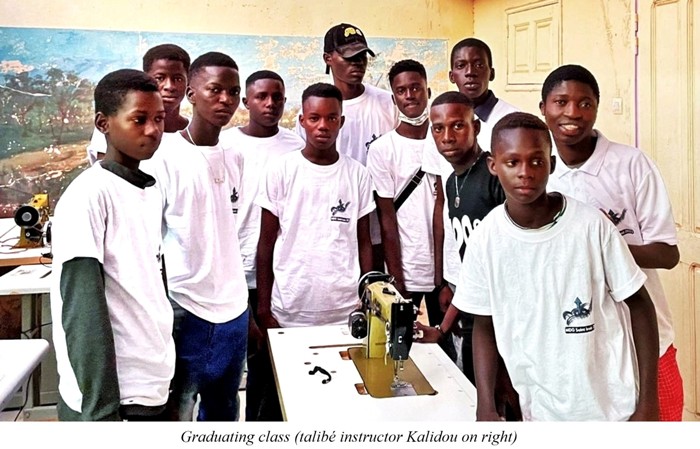
Encouraging progress in setting begging street children on the path to self-sufficiency
Offering apprenticeship training to begging talibé children has many challenges that
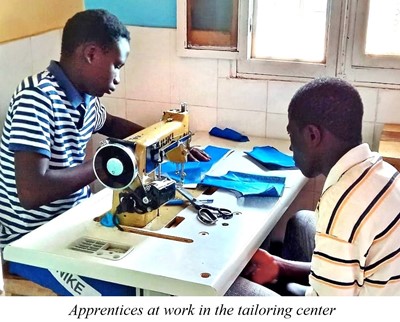 are not present
in a normal learning environment. The children, usually in their late teens, have no formal
education and are unaccustomed to investing long hours in learning something for the future. The
experience of begging, which most of them have lived since a very young age, is one of instant
gratification … the immediate need to do what must be done to eat and avoid being beaten.
are not present
in a normal learning environment. The children, usually in their late teens, have no formal
education and are unaccustomed to investing long hours in learning something for the future. The
experience of begging, which most of them have lived since a very young age, is one of instant
gratification … the immediate need to do what must be done to eat and avoid being beaten.
Apprenticeship requires a very different perspective, and our challenge is to motivate the youth
in a way that can be successful. Marabouts react negatively if the apprentices fall short on their
begging quotas. Some apprentices don’t get enough to eat, because of taking time from begging.
And, after a good start, some can lose their focus and commitment.
A one-year grant gave us the opportunity to test strategies for success.
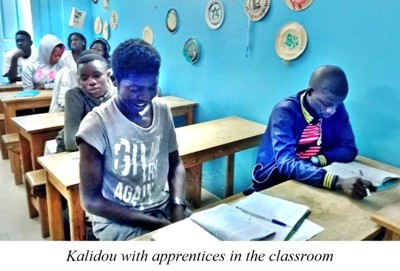 Fifteen talibé youth were
registered in our sewing apprenticeship program, and eleven of them completed the program successfully.
Fifteen talibé youth were
registered in our sewing apprenticeship program, and eleven of them completed the program successfully.
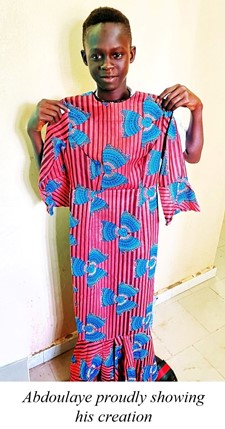
Graduation day was very special at Maison de la Gare as a broad cross-section of the Saint Louis
community gathered to celebrate the success of these impressive young men. Sewing machines were
given to ten of them, to support them in beginning their professional lives.
The ceremony was presided over by Madame Fatou Sy Barro representing the Prefect of the Saint
Louis district. She is head of the Social Action Department and president of the Departmental
Child Protection Committee. Other notables attending included the heads of the local office of
the Ministry of Justice responsible for street children (AEMO – Educational Action in Open
Environments) and of the Centre for Promotion and Social Reintegration (CPRS), two imams, the
president of the 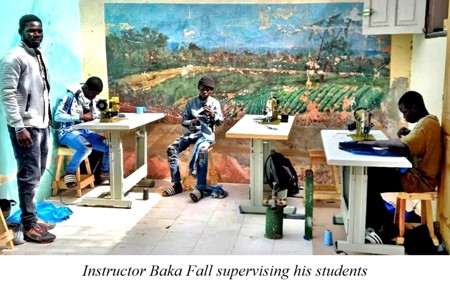 Badjenu Goxx (a social organization of community godmothers) and beneficiaries
of Maison de la Gare’s microfinance program. Other invitees included Maître Aba Talib Gueye, a
court lawyer and children's advocate, about thirty of the apprentices' family members, several
marabouts, and members of Maison de la Gare’s staff.
Badjenu Goxx (a social organization of community godmothers) and beneficiaries
of Maison de la Gare’s microfinance program. Other invitees included Maître Aba Talib Gueye, a
court lawyer and children's advocate, about thirty of the apprentices' family members, several
marabouts, and members of Maison de la Gare’s staff.
Maison de la Gare’s president Issa Kouyaté welcomed everyone. He explained the objectives of
the project while thanking our donors for making this dream of Maison de la Gare possible. Baka
Fall, the tailoring instructor, congratulated the learners and Maison de la Gare. He said that
we must not stop and should continue to train at least as many young people
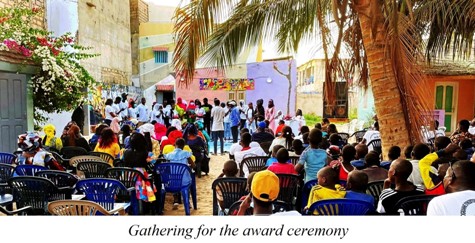 each year.
each year.
Talibé Pape Yoro spoke on behalf of his fellow graduates. He praised the organization of such
a festival and thanked the donors for giving him a trade and a machine to start his life; he
promised never to exchange, sell or barter this machine.
Marabout Thierno Yéril Sow spoke next. He admitted that he and his fellow marabouts did not
understand the project in the beginning, but they are now ready to encourage their talibés and
to collaborate more with Maison de la Gare.
Finally, Madame Barro welcomed the ceremony and encouraged the graduates. She
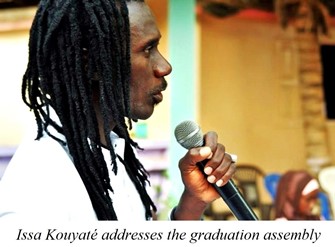 offered them much
useful advice. Speaking to the marabouts, she celebrated this “beautiful way” of helping the
children to find jobs to ensure their survival and future autonomy. And she thanked Maison de
la Gare and its partners for understanding this.
offered them much
useful advice. Speaking to the marabouts, she celebrated this “beautiful way” of helping the
children to find jobs to ensure their survival and future autonomy. And she thanked Maison de
la Gare and its partners for understanding this.
A fashion show was organized to showcase products made by the apprentices. The press was well
represented at this event, with reporting on ZIG-FM (a local and national radio station), SEN-TV
and Ndar-Info, an online television station.
We have learned valuable lessons from this experience and are already applying these in our
apprenticeship programs for 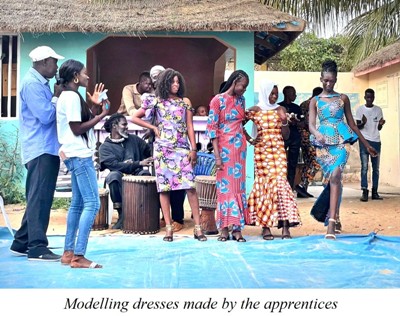 the talibé youth. The marabouts must be involved from the very
beginning, at the time of recruitment. Also, the talibé students and their marabouts or parents
should sign a legal commitment to the program before the training begins, to underline the
seriousness of both the commitment and the opportunity. Some financial support is essential to
allow the students to complete the program. And, we are reinforcing the basic literacy, maths
and entrepreneurial training which must go hand-in-hand with learning the technical skills.
the talibé youth. The marabouts must be involved from the very
beginning, at the time of recruitment. Also, the talibé students and their marabouts or parents
should sign a legal commitment to the program before the training begins, to underline the
seriousness of both the commitment and the opportunity. Some financial support is essential to
allow the students to complete the program. And, we are reinforcing the basic literacy, maths
and entrepreneurial training which must go hand-in-hand with learning the technical skills.
Many talibé children have been motivated by the success of these graduates, and we are very
hopeful for the future.
_______________
We are grateful to GO Campaign of California whose grant made this one-year project
possible, and to all our international donors who have supported us over the years and whose
continuing commitment will allow us to set many more youth on their paths to independence.

